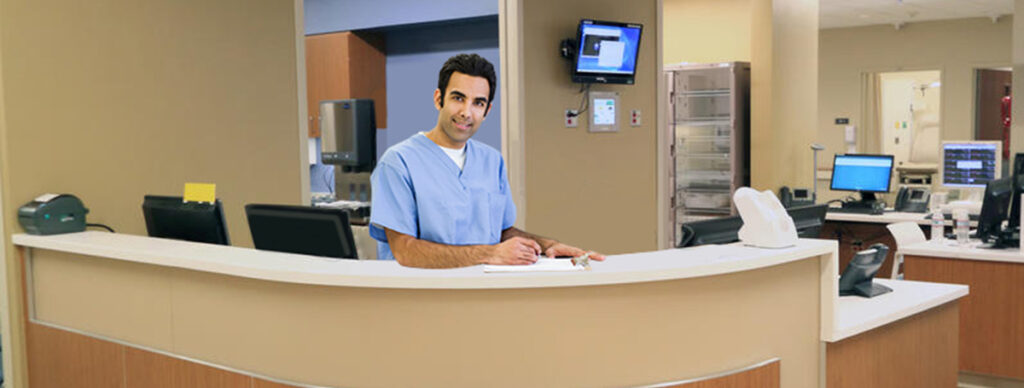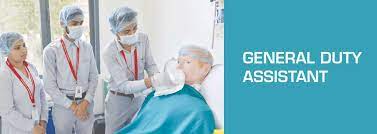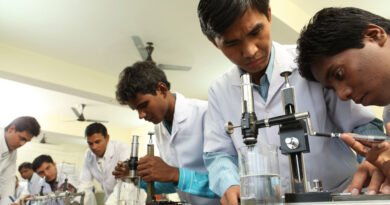Free Hospital Front Desk Coordinator Course (1year Diploma Course)
Hospital Front Desk Coordinator click here
Brief Job Description:- Individuals in this job are usually the first contact point in healthcare organizations encountered by patients and visitors, whether on the phone, online or in person. They assist in coordination at Front Desk at Healthcare Facility
Personal Attributes: -The job requires individuals to have good communication skills and ability to handle a high level of stress and activity while managing fast- paced office duties. They must be computer savvy. They must be skilled to interact with a wide range of personality types in both pleasant and difficult situations . The job requires individuals to possess key qualities such as patience, confidence, maturity, compassion, patient centricity, good listening circumstances Hospital Front Desk Coordinator Course.

Customer Interaction and Handling Hospital Front Desk Coordinator Course:- To be competent, the user/individual on the job must be able to
PC1. analyse the requirement of visitors and answer the queries accordingly.
PC2. handle the queries received over a phone/mail/visiting patients etc. applying relevant medical words & terms used in hospitals.
PC3. coordinate for care needs with other care providers through appropriate communication method.
PC4. manage need and requirement of patient’s relative and hospital/clinic staff.
PC5. enter patient details and other data in Hospital Information System/relevant communication channel.
PC6. Up- to-date with latest details & schedules of Doctors, specialties, appointment timings, bed occupancy, approx. discharge timings, cost etc.
Manage patient flow:- PC7. manage requirements of patients, their attendants & visitors from admission to discharge
PC8. manage requirements of doctors & hospital staff
PC9. manage special requirements of differently abled persons or special needs required by patients
PC10. handle tactfully Officials & VIPs as per the needs in accordance to hospital policies
PC11.ensure smooth patient flow within the hospital Hospital Front Desk Coordinator Course.
PC12. ensure hospital environment is comfortable & pleasing to patients, visitors, employees & others

Carry out patient registration Hospital Front Desk Coordinator Course:- registration
PC13. collect information and documents for patient registration complying with regulatory and organizational requirements
PC14. cross check the identity document details of the patients against original
PC15. complete the registration details after interacting with the patient/attenders & concerned physician on details including room type, room number, tariff details, health insurance details, payment method etc.
PC16.receive patient/attendant signature on completed patient registration document
PC17. update the patient registration details to relevant authority.
PC18. return the original document immediately after scanning or copying
PC19. ensure all mandatory patient details are captured as per regulatory requirement
PC20. cross check patient details appropriately for patient identification purposes
Legal & ethical aspects of front desk management Hospital Front Desk Coordinator Course:-
PC21. address the concerns as per the set TAT (Turn Around Time) criteria for the area involved.
PC22. set different goals for patient care keeping in mind the hospitals policy
PC23. raise alarm and announce emergency code as defined & as per situation
PC24 maintain confidentiality of patient records, medico legal cases, preservation, information management
PC 25. comply with relevant legislation, standards, policies and procedures
Assist for TPA services:- services PC26.assist for queries regarding availing of medical insurance
PC27. direct the patient/attenders to the concerned department or authority
PC28. assist for various third party payment mechanisms including CGHS, ECHS, Public Sector undertakings, types of special arrangements , Universal Health Insurance coverage scheme in prevalent states
PC29. ensure eligible person is availing the facility


Provide comfort to visitors/customers and patients as per organizational process Hospital Front Desk Coordinator Course:-
To be competent, the user/individual on the job must be able to
PC1. maintain service excellence in healthcare settings keeping empathy, passion and patience Hospital Front Desk Coordinator Course.
PC2. meet patients / visitors expectations as much as possible in various hospital areas in accordance to organizational policies
PC3. coordinate to address complaints related to service provided
PC4. ensure corrective & preventive actions are taken timely for patients / visitors concerns
PC5. know the departmental process and adhere to them while assisting
PC6. indulge in training at regular intervals to learn best practices
PC7. apply process quality tools used in the organization as directed
Process payments transactions & Reconcile patient accounts Hospital Front Desk Coordinator Course:- To be competent, the user/individual on the job must be able to
PC1. identify the services being rendered to the client
PC2. assess accurateness of the invoice generated through various means
PC3. check that payments from patients are valid and accurate
PC4. record payments from patients promptly and accurately as per organizational policies
PC5. record clearly and accurately the reasons if payments are overdue Hospital Front Desk Coordinator Course.
PC6. identify problems accurately and sort them out promptly
PC7. inform senior or concerned authority promptly about any problems which can’t be sorted out
PC8. store collected payments securely and in line with organization policies.
PC9. check that charges, credits made to patient accounts are correct
PC10.identify and sort out problems with patient accounts
PC11.inform senior or concerned authority promptly about problems with patient accounts which are beyond the limits of competence & authority

Communicating & maintaining professional behavior with co-workers and patients & their families:- To be competent, the user/individual on the job must be able to
PC1. communicate effectively with all individuals regardless of age, caste, gender, community or other characteristics without using terminology unfamiliar to them
PC2. utilize all training and information at one’s disposal to provide relevant information to the individual
PC3. confirm that the needs of the individual have been met
PC4. respond to queries and information needs of all individuals Hospital Front Desk Coordinator Course.
PC5. adhere to guidelines provided by one’s organization or regulatory body relating to confidentiality
PC6. respect the individual’s need for privacy
PC7. maintain any records required at the end of the interaction
Working with other people to meet requirements:- PC8. integrate one’s work with other people’s work effectively
PC9. utilize time effectively and pass on essential information to other people on timely basis
PC10. work in a way that shows respect for other people
PC11. carry out any commitments made to other people
PC12. reason out the failure to fulfill commitment
PC13. identify any problems with team members and other people and take the initiative to solve these problems
Establishing and managing requirements:- PC14. clearly establish, agree, and record the work requirements
PC15. ensure his/her work meets the agreed requirements
PC16. treat confidential information correctly Hospital Front Desk Coordinator Course.
PC17. work in line with the organization’s procedures and policies and within the limits of his/her job role
Acting within the limit of one’s competence and authority:- To be competent, the user/individual on the job must be able to
PC1. adhere to legislation, protocols and guidelines relevant to one’s role and field of practice
PC2. work within organizational systems and requirements as appropriate to one’s role
PC3. recognize the boundary of one’s role and responsibility and seek supervision when situations are beyond one’s competence and authority
PC4. maintain competence within one’s role and field of practice
Following the code of conduct and demonstrating best practices in the field:- PC5.maintain personal hygiene and contribute actively to the healthcare ecosystem
PC6.use relevant research based protocols and guidelines as evidence to inform one’s practice
PC7.promote and demonstrate good practice as an individual and as a team member at all times
PC8.identify and manage potential and actual risks to the quality and safety of practice
PC9.evaluate and reflect on the quality of one’s work and make continuing improvements
Complying the health, safety and security requirements and procedures for workplace:-
To be competent, the user/individual on the job must be able to Hospital Front Desk Coordinator Course.
PC1. identify individual responsibilities in relation to maintaining workplace health safety and security requirements
PC2. comply with health, safety and security procedures for the workplace
PC3. comply with health, safety and security procedures and protocols for environmental safety
Handling hazardous situation:- PC4. identify potential hazards and breaches of safe work practices
PC5. identify and interpret various hospital codes for emergency situations
PC6. correct any hazards that individual can deal with safely, competently and within the limits of authority
PC7. provide basic life support (BLS) and first aid in hazardous situations, whenever applicable
PC8. follow the organization’s emergency procedures promptly, calmly, and efficiently
PC9. identify and recommend opportunities for improving health, safety, and security to the designated person
PC10. complete any health and safety records legibly and accurately
Reporting any hazardous situation:-

PC11. report any identified breaches in health, safety, and security procedures to the designated person Hospital Front Desk Coordinator Course.
PC12. promptly and accurately report the hazards that individual is not allowed to deal with to the relevant person and warn other people who may get affected
Classification of the Waste Generated, Segregation of Biomedical Waste ,Proper collection and storage of Waste:- To be competent, the user/individual on the job must be able to
PC1. handle, package, label, store, transport and dispose of waste appropriately to minimize potential for contact with the waste and to reduce the risk to the environment from accidental release
PC2.store clinical or related waste in an area that is accessible only to authorized persons
PC3. minimize contamination of materials, equipment and instruments by aerosols and splatter
Complying with an effective infection control protocols:- PC4. apply appropriate health and safety measures following appropriate personal clothing & protective equipment for infection prevention and control
PC5. identify infection risks and implement an appropriate response within own role and responsibility in accordance with the policies and procedures of the organization
PC6. follow procedures for risk control and risk containment for specific risks. Use signs when and where appropriate
PC7. follow protocols for care following exposure to blood or other body fluids as required
PC8. remove spills in accordance with the policies and procedures of the organization
PC9.clean and dry all work surfaces with a neutral detergent and warm water solution before and after each session or when visibly soiled
PC10. demarcate and maintain clean and contaminated zones in all aspects of health care work
PC11. confine records, materials and medicaments to a well‐designated clean zone Hospital Front Desk Coordinator Course.
PC12. confine contaminated instruments and equipment to a well‐designated contaminated zone
PC13. decontaminate equipment requiring special processing in accordance with quality management systems to ensure full compliance with cleaning, disinfection and sterilization protocols
PC14. replace surface covers where applicable
PC15. maintain and store cleaning equipment
PC16. report and deal with spillages and contamination in accordance with current legislation and procedures

Maintaining personal protection and preventing the transmission of infections from person to person:- PC17. maintain hand hygiene following hand washing procedures before and after patient contact /or after any activity likely to cause contamination
PC18. cover cuts and abrasions with water‐proof dressings and change as necessary
PC19.change protective clothing and gowns/aprons daily, more frequently if soiled and where appropriate, after each patient contact
PC20. perform additional precautions when standard precautions alone may not be sufficient to prevent transmission of infection
Guidelines for Assessment:- 1. Criteria for assessment for each Qualification Pack will be created by the Sector Skill Council. Each Performance Criteria (PC) will be assigned marks proportional to its importance in NOS. SSC will also lay down proportion of marks for Theory and Skills Practical for each
PC. 2. The assessment for the theory part will be based on knowledge bank of questions created by the
SSC. 3. Assessment will be conducted for all compulsory NOS, and where applicable, on the selected elective/option NOS/set of NOS.
4. Individual assessment agencies will create unique evaluations for skill practical for every student at each examination/training center based on this criterion.
5. To pass the Qualification Pack , every trainee should score a minimum of 70% of aggregate marks to successfully clear the assessment.
6. In case of unsuccessful completion, the trainee may seek reassessment on the Qualification Pack.
accomplish allocated task at hospital front desk:-
PC1. Analyse the requirement and answer the queries accordingly
PC2. Handle the queries received over a phone/mail/visiting patients etc. applying relevant medical words & terms used in hospitals
PC3. Coordinate for care needs with other care providers through appropriate communication method Hospital Front Desk Coordinator Course.
PC4. Manage need and requirement of patient’s relative and hospital/clinic staff.
PC5. Enter patient details and other data in Hospital Information System/relevant communication channel.
PC6. Up- to-date with latest details & schedules of Doctors, specialties, appointment timings, bed occupancy, approx. discharge timings, cost etc.
PC7. Manage requirements of patients, their attendants & visitors from admission to discharge
PC8. Manage requirements of Doctors & hospital staff
PC9 Manage special requirements of differently abled persons or special needs required by patients
PC10. Handle tactfully Officials & VIPs as per the needs in accordance to hospital policies
PC11.Ensure smooth patient flow within the hospital
PC12. Ensure hospital environment is comfortable & pleasing to patients, visitors, employees & others
PC13. Collect information and documents from new patient or recheck of repeat patient for patient registration with compliance to regulatory and organizational requirements
PC14. Cross check the identity document details of the patients against origina
PC15. Complete the registration details after interacting with the patient/attenders & concerned physician on details including room type, room number, tariff details, health insurance details, payment method etc.
PC16.. Receive patient signature on completed patient registration document
PC17. Update the patient registration details to relevant authority.
PC18. Return the original document immediately after scanning or copying
PC19. Ensure all mandatory patient details are captured as per regulatory requirement
PC20. Cross check patient details appropriately for patient identification purposes
PC21. Address the concerns as per the set TAT (Turn Around Time) criteria for the area involved.
PC22. Set different goals for patient care keeping in mind the hospitals policy
PC23. Raise alarm and announce emergency code as defined & as per situation
PC24 Maintain confidentiality of patient records, medico legal cases, preservation, information management
PC25. Comply with relevant legislation, standards, policies and procedures
PC26. Assist for queries regarding availing of medical insurance
PC27.Direct the patient/attenders to the concerned department or authority
PC28.Assist for various third party payment mechanisms including CGHS, ECHS, Public Sector undertakings, types of special arrangements , Universal Health Insurance coverage scheme in prevalent states
PC29. Ensure eligible person is availing the facility
Ensure Customer Service Excellence & Patient Satisfaction:-
PC1. Maintain service excellence in healthcare settings keeping empathy, passion and patience
PC2. Meet patients / visitors expectations as much as possible in various hospital areas in accordane to organizational policies
PC3. Coordinate to address complaints related to service provided
PC4. Ensure corrective & preventive actions are taken timely for patients / visitors concerns
PC5. Know the departmental process and adhere to them while assisting
PC6. Indulge in training at regular intervals to learn best practices
PC7. Apply process quality tools used in the organization as directed
Perform billing activities:-
PC1. Identify the services being rendered to the client
PC2. Assess accurateness of the invoice generated through various means
PC3. Check that payments from patients are valid and accurate
PC4. Record payments from patients promptly and accurately as per organizational policies
PC5. Record clearly and accurately the reasons if payments are overdue.
PC6. Identify problems accurately and sort them out promptly.
PC7. Inform senior or concerned authority promptly about any problems that you cannot sort out
PC8. Store collected payments securely and in line with organization Policies
PC9. Check that charges, credits made to patient accounts are correct
PC10. Identify and sort out problems with patient accounts
PC11. Inform senior or concerned authority promptly about problems with patient accounts which are beyond the limits of competence & authority

Maintain Interpersonal relationship with colleagues, patients and others:-
PC1. Communicate effectively with all individuals regardless of age, caste, gender, community or other characteristics without using terminology unfamiliar to them
PC2. Utilize all training and information at one’s disposal to provide relevant information to the individual
PC3. Confirm that the needs of the individual have been met
PC4. Respond to queries and information needs of all individuals
PC5. Adhere to guidelines provided by one’s organization or regulatory body relating to confidentiality
PC6. Respect the individual’s need for privacy
PC7. Maintain any records required at the end of the interaction
PC8. Integrate one’s work with other people’s work effectively
PC9. Utilize time effectively and pass on essential information to other people on timely basis
PC10. Work in a way that shows respect for other people
PC11. Carry out any commitments made to other people
PC12. Reason out the failure to fulfill commitment
PC13. Identify any problems with team members and other people and take the initiative to solve these problems
PC14. Clearly establish, agree, and record the work requirements
PC15. Ensure his/her work meets the agreed requirements
PC16. Treat confidential information correctly
PC17. Work in line with the organization’s procedures and policies and within the limits of his/her job role
Maintain professional & medicolegal conduct:-
PC1. Adhere to legislation, protocols and guidelines relevant to one’s role and field of practice
PC2. Work within organizational systems and requirements as appropriate to one’s role
PC3. Recognize the boundary of one’s role and responsibility and seek supervision when situations are beyond one’s competence and authority
PC4. Maintain competence within one’s role and field of practice
PC5. Maintain personal hygiene and contribute actively to the healthcare ecosystem
PC6. Use relevant research based protocols and guidelines as evidence to inform one’s practice
PC7. Promote and demonstrate good practice as an individual and as a team member at all times
PC8. Identify and manage potential and actual risks to the quality and safety of practice
PC9. Evaluate and reflect on the quality of one’s work and make continuing improvements
Maintain a safe, healthy and secure working environment:-
PC1. Identify individual responsibilities in relation to maintaining workplace health safety and security requirements
PC2. Comply with health, safety and security procedures for the workplace
PC3. Comply with health, safety and security procedures and protocols for environmental safety
PC4. Identify potential hazards and breaches of safe work practices
PC5. Identify and interpret various hospital codes for emergency situations
PC6. Correct any hazards that individual can deal with safely, competently and within the limits of authority
PC7. Provide basic life support (BLS) and first aid in hazardous situations, whenever applicable
PC8. Follow the organization’s emergency procedures promptly, calmly, and efficiently
PC9. Identify and recommend opportunities for improving health, safety, and security tothe designated person.
PC10. Complete any health and safety records legibly and accurately
PC11. Report any identified breaches in health, safety, and security procedures to the designated person
PC12. Promptly and accurately report the hazards that individual is not allowed to deal with, to the relevant person and warn other people who may get affected
biomedical waste disposal and infection control policies and procedures:-
PC1. Handle, package, label, store, transport and dispose of waste appropriately to minimize potential for contact with the waste and to reduce the risk to the environment from accidental release
PC2.Store clinical or related waste in an area that is accessible only to authorized persons
PC3. Minimize contamination of materials, equipment and instruments by aerosols and splatter
PC4. Apply appropriate health and safety measures following appropriate personal clothing & protective equipment for infection prevention and contro
PC5. Identify infection risks and implement an appropriate response within own role and responsibility in accordance with the policies and procedures of the organization
PC6. Follow procedures for risk control and risk containment for specific risks. Use signs when and where appropriate
PC7. Follow protocols for care following exposure to blood or other body fluids as required
PC8. Remove spills in accordance with the policies and procedures of the organization
PC9.Clean and dry all work surfaces with a neutral detergent and warm water solution before and after each session or when visibly soiled
PC10: Demarcate and maintain clean and contaminated zones in all aspects of health care work
PC11. Confine records, materials and medicaments to a well‐designated clean zone
PC12. Confine contaminated instruments and equipment to a well‐designated contaminated Zone
PC13. Decontaminate equipment requiring special processing in accordance with quality management systems to ensure full compliance with cleaning, disinfection and sterilization protocols
PC14. Replace surface covers where applicable
PC15. Maintain and store cleaning equipment
PC16. Report and deal with spillages and contamination in accordance with current legislation and procedures
PC17. Maintain hand hygiene following hand washing procedures before and after patient contact and/or after any activity likely to cause contamination
PC18. Cover cuts and abrasions with water‐proof dressings and change as necessary
PC19.Change protective clothing and gowns/aprons daily, more frequently if soiled and where appropriate, after each patient contact
PC20. Perform additional precautions when standard precautions alone may not be sufficient to prevent transmission of infection
Organizational Context:- The user/individual on the job needs to know and understand:
KA1. relevant up-to-date information on health, safety, and security that applies to the organization
KA2.organization’s emergency procedures and responsibilities for handling hazardous situations
KA3. person(s) responsible for health, safety, and security in the organization
KA4. good personal hygiene practice including hand care
Technical Knowledge:- The user/individual on the job needs to know and understand:
KB1. importance of and how to handle, package, label, store, transport and dispose of waste appropriately to minimize potential for contact with the waste and to reduce the risk to the environment from accidental release
KB2. the importance to adhere to the organizational and national waste management principles and procedures
KB3. the hazards and risks associated with the disposal and the importance of risk assessments and how to provide these
KB4. the required actions and reporting procedures for any accidents, spillages and contamination involving waste
KB5. the requirements of the relevant external agencies involved in the transport and receipt of your waste
KB6. the importance of organizing, monitoring and obtaining an assessment of the impact the waste may have on the environment
KB7. The current national legislation, guidelines, local policies and protocols which affect work practice
KB8. the policies and guidance that clarify scope of practice, accountabilities and the working relationship between yourself and others
KB9. identification and management of infectious risks in the workplace
KB10. aspects of infectious diseases including opportunistic organisms & pathogens
KB11.basic microbiology including bacteria and bacterial spores, fungi, viruses
KB12. the path of disease transmission including direct contact and penetratinginjuries, risk of acquisition
KB13. how to clean and sterile techniques
KB14. susceptible hosts including persons who are immune suppressed, have chronic diseases such as diabetes and the very young or very old
KB15. routine surface cleaning procedures at the start and end of the day, managing a blood or body fluid spill
KB16. sharps handling and disposal techniques
KB17.effective hand hygiene including hand wash, surgical hand wash, when hands must be washed KB18. good personal hygiene practice including hand care
KB19. how to use personal protective equipment such as:
KB20. The personal clothing and protective equipment required to manage the different types of waste generated by different work activities
Core Skills/ Generic Skills:- The user/ individual on the job needs to know and understand how to:
SA1. report and record incidents
Reading Skills:- The user/individual on the job needs to know and understand how to:
SA2.read and understand company policies and procedures pertaining to managing biomedical waste and infection control and prevention
(Oral Communication (Listening and Speaking skills):- The user/individual on the job needs to know and understand how to:
SA3. listen patiently
SA4. report hazards and incidents clearly with the appropriate level of urgency
Professional Skills:- The user/individual on the job needs to know and understand how to:
SB1. take in to account opportunities to address waste minimization, environmental responsibility and sustainable practice issues
SB2. apply additional precautions when standard precautions are not sufficient
Plan and Organize:- The user/individual on the job needs to know and understand:
SB3. consistently ensure instruments used for invasive procedures are sterile at time of use (where appropriate)
SB4. consistently follow the procedure for washing and drying hands
SB5. consistently maintain clean surfaces and limit contamination
Customer Centricity:- The user/individual on the job needs to know and understand how to:
SB6.how to make exceptional effort to keep the environment and work place clean
Problem Solving:- The user/individual on the job needs to know and understand how to:
SB7. identify hazards and suggest effective solutions to identified problems pertaining to hospital waste and related infections
Analytical Thinking:- The user/individual on the job needs to know and understand how to:
SB8. analyze the seriousness of hazards pertaining to hospital waste and related infections
Critical Thinking:- The user/individual on the job needs to know and understand how to:
SB9. apply, analyze, and evaluate the information gathered from observation, experience, reasoning, or communication, as a guide to act
SB10. take into account opportunities to address waste minimization, prevent infection, environmental responsibility and sustainable practice issues








